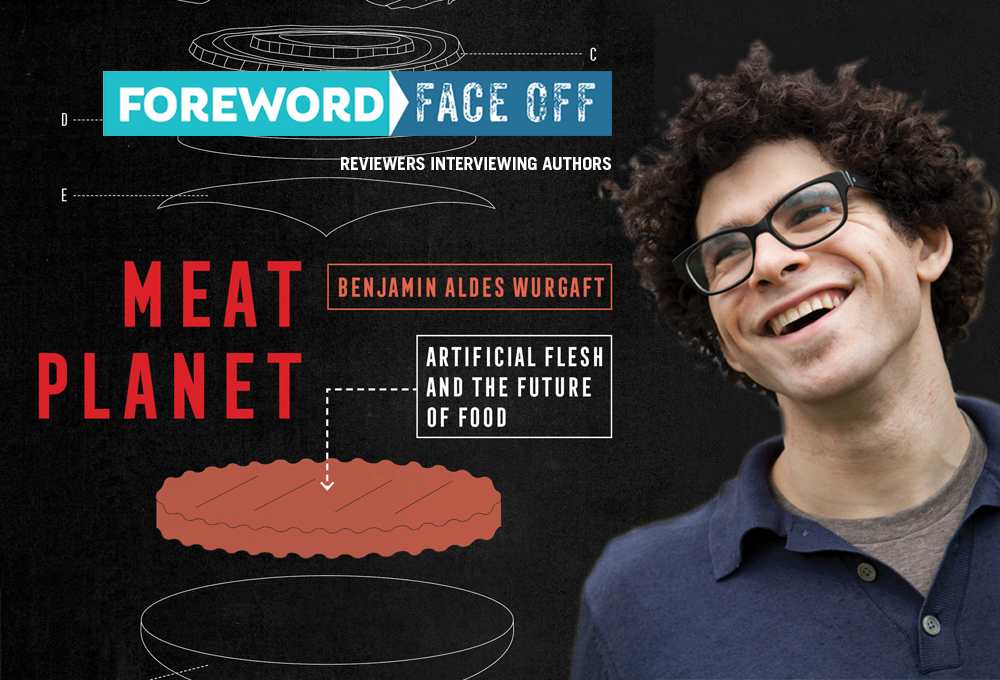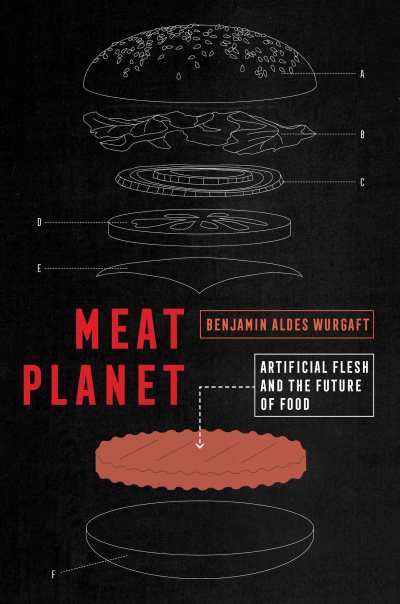Reviewer Rachel Jagareski Interviews Benjamin Aldes Wurgaft, Author of Meat Planet: Artificial Flesh and the Future of Food

As a meat eater, are you 100 percent comfortable with the inner workings of slaughterhouses? Do you think about the last hours of the pigs who supply your bacon at breakfast, or the chickens who make the ultimate sacrifice for your Happy Hour wings at TGIFs? And what about those sweet, wouldn’t-hurt-a-flea cows who give their lives for your burgers and steaks? Their end-of-life story isn’t so pretty either, to say the least.
Forgive us if these questions make you uncomfortable. We just think it’s important that everyone spends some time mulling over the ethics of raising and slaughtering animals for our food—especially now that there’s high-quality, plant-based substitutes like Beyond Meat.

As the moral dilemmas continue to add up for omnivores, Benjamin Wurgaft steps in to help with his masterful new book Meat Planet. In her review for the September/October issue of Foreword Reviews, Rachel Jagareski writes that by encouraging “deep thinking around ingrained beliefs and eating habits, Meat Planet conjures up a range of options for the future. It is intellectually and ethically challenging material.”
Rachel relished the opportunity to fire a few thoughtful questions at Ben, so we quickly reached out to the University of California Press to set up this conversation.
Rachel, you’re on.
I initially assumed that your book would be a straightforward survey of technological developments of meat alternatives, but your book delightfully covers much more ground. Meat Planet explores diverse aspects of carnivory, from the history and development of industrial livestock farming, philosophical considerations, and side trips to discuss tissue generation for medical and clothing uses.
How did you keep focus as a writer as you dove deeper into this subject and more questions and avenues for research and consideration kept cropping up?
Although I first trained as an historian, I did my research for Meat Planet via ethnography, the traditional method of cultural anthropologists, and the ethnographic method means abandoning preconceptions about where a story is going to lead. You might end up observing a group of scientists as they grow muscle cells and help them organize into fibers, but your travels might also lead to a reference to Greek myth, or to a debate over what we mean when we call something “natural,” or to a place like the San Francisco Bay Area, where some people praise progress and economic growth while other people are displaced from their homes by the winds of so-called “progress.”
I wrote Meat Planet by beginning with ethnographic episodes and then following them back into the histories—histories of science, of food, of ideas—that I needed in order to understand them. These diversions or detours, rather than a singular focus or a single argument, are the book’s real method, and I was lucky I had the time to pursue many of them.
The overall promise of cultured meat offers so many potential benefits for animal welfare, zoonotic disease prevention, environmental health, and food security. However, I appreciate your thought-provoking pivot away from viewing artificial flesh as a panacea, considering it instead as one possible tool in alleviating these problems. You also discuss replacing the very idea of needing to produce more meat with striving to eat less of it and/or distributing it more equitably around the world.
In a society that veers toward black and white thinking, sound bites, and the presumption that technology will solve the world’s problems, are you optimistic that this more nuanced kind of wide-scale change is viable?
Meat Planet starts with the official “pitch” on behalf of cultured meat, namely that replacing industrial animal meat production with an in vitro alternative, beginning with animal cells but requiring no slaughter, would allow human beings to continue to eat meat without industrial meat’s ethical and environmental “footprints.” And you can imagine a book about cultured meat that takes that pitch very seriously, exploring the promise of cultured meat, assessing its possible impact, and even promoting cultured meat and making heroes of its pioneers—that’s a familiar type of book about an emerging technology.
Meat Planet isn’t that book. I wanted to know what made cultured meat imaginable in the first place, and what aspects of the contemporary human condition—appetites, hopes, anxieties—it illuminates. So I zoom out from the TED-talk-like promise of cultured meat to the historical, anthropological, and philosophical questions. How did we come to consume meat, as a species? What role may it have played in our evolution, and does our past history with meat dictate anything about our future? How do we think about the line between humans and other animals?
I also wanted to meditate on questions related to our expectations for technology: why do we often think of the future as being embodied by technological shifts rather than, say, social or political shifts? Why is it easier for some people to imagine growing meat in a lab than imagining a widespread shift towards vegetarianism? Why is it easier to imagine that a pair of abstractions—“technology” and “the market”—can change the world, than to imagine that humans might change their behavior?
But you asked me about optimism. I wouldn’t say that I’m optimistic that we’ll escape the hold that technological panaceas have on the popular imagination! It’s a powerful form of imaginative capture. But I’m more optimistic that we can, at least, shift our view of the problems at hand, and see that they have a social and political character. Food isn’t simply a matter of production and consumption, but of regulation. Markets aren’t apolitical. As governments confront the multiple crises of climate change, they’ll need to take food security very seriously indeed, and I’d expect that to expose the political character of food systems pretty quickly.
As your book recounts, the technology of tissue growth is still in its infancy and currently relies upon animal hormones and large infusions of time and capital. Have there been any significant breakthroughs in the progress of this technology since you finished writing the book? What do you see as the biggest barrier to this kind of technological advance?
This question is difficult to answer concretely, for a specific reason. While I was researching cultured meat—2013 to 2019—a shift occurred so that more and more of the research now takes place in startups backed by venture capital, in which the principals have a responsibility to protect the intellectual property they develop. That’s understandable but it also creates a problem for those of us who try to track the technology’s development: the people we do fieldwork with—the people anthropologists used to call their “informants”—often can’t tell us much. This produces a black-box effect.
I can tell you that when my research ended, the biggest (but not the only) technical problems seemed to be finding a growth media for animal cells that does not include what’s called Fetal Bovine Serum, or FBS, and figuring out ways to grow complex structures of muscle and fat so that we can replicate more complex forms of meat, like steak. The latter probably means creating a fully “vascularized” bioreactor that can transmit nutrients to thick pieces of tissue rather than to single layers of cells. It’s entirely possible that researchers—either in academic labs or in startups—have overcome these challenges in a way that they can “scale” towards the industrial production of lab-grown meat, but it hasn’t yet been established.
All that said, the outcome of the research isn’t the story Meat Planet tells; it was crucial to my research to track other people’s predictions and ask what they mean, rather than making my own. Sometimes the most intellectually responsible thing to do is to acknowledge what we can’t know.
Your sections about the futurism industry and venture capitalist investment in the future of food were fascinating. Not only did you give us peeks into this rarified subculture, but your training in anthropology was invaluable in dissecting cultural viewpoints framing the meaning of food, meat, and the human impulse to dominate animals and nature.
Aside from the possibility of consuming artificial flesh, how do you see our Western diets changing in the coming decades? Do you think dietary changes will stem more from corporate marketing efforts, consumers, or social movements? Or cheap food alternatives?
I’m professionally shy about prediction. Anyone who makes a concrete prediction—“bugs!” “lab meat!” “hydroponics!”—is probably selling you something, or in cahoots with someone who’d like to. Futurism at its best, I think, isn’t a practice of prediction but of contemplating possibilities in order to expose every available option for action in the present, and helping people sort through their preconceptions and goals. It’s an imaginative exercise with practical, moral, and aesthetic dimensions.
That said, I’m enthusiastic about finding imaginative resources in cooking itself—many of the cuisines we enjoy developed out of scarcity, and the need to make limited resources feed a lot of people. Consider, for example, the meat sauces of a village in pre-industrial Italy, a means for making a single animal feed a large gathering. I’m not trying to romanticize the agrarian world, here, but when we think less about products and more about human practices, like cooking, our available options suddenly change.
Another thing I didn’t expect from your book was its humor. The playful language (franken burgers, cornucopians, vat meat) and the witty turns of phrase (referencing the possibility of including more insects and roadkill in the Western diet, “we will have to chew what we previously eschewed”) made for sparkling reading about a dense topic. Is humor an important part of writing about science and technology for a general audience?
Cultured meat is hilarious. And many people in the field understand this intuitively; they’re playful and they make jokes about their work. That’s nice because other parts of the cultured meat world seem fueled by high-octane moral sanctimony that it almost feels like I have a professional obligation to mock. Of course, when anyone deploys humor, including me, it’s worth asking why. Perhaps cultured meat is hilarious because it also unsettles me, challenging many of my default assumptions about animal life or about the relationship between meat, animal bodies, and death. I also had a more literary reason for writing this way: I tried to write Meat Planet in a low humorous style because, in the history of Western literature, “low” style is often associated with the mundane, with everyday life, as opposed to the “high” style that might describe the affairs of gods and heroes.
As a self-described ambivalent omnivore, did your own eating habits change over the five years during which you researched and wrote your book?
Researching and writing Meat Planet forced me to confront one of my moral failings: I think that killing and eating animals at an industrial scale has no good defense, and yet I do consume meat, along with other animal products, and I’m sure that much of it has industrial rather than “pastoral” origins. I aspire to eat animals whose lives and deaths I can affirm, and to make meat more of a condiment, less of a pillar of my meals. But I never developed the desire to become vegetarian or vegan. To give up animal products entirely feels too much like an expression of moral certainty, and that’s something I mistrust deeply.
Rachel Jagareski
